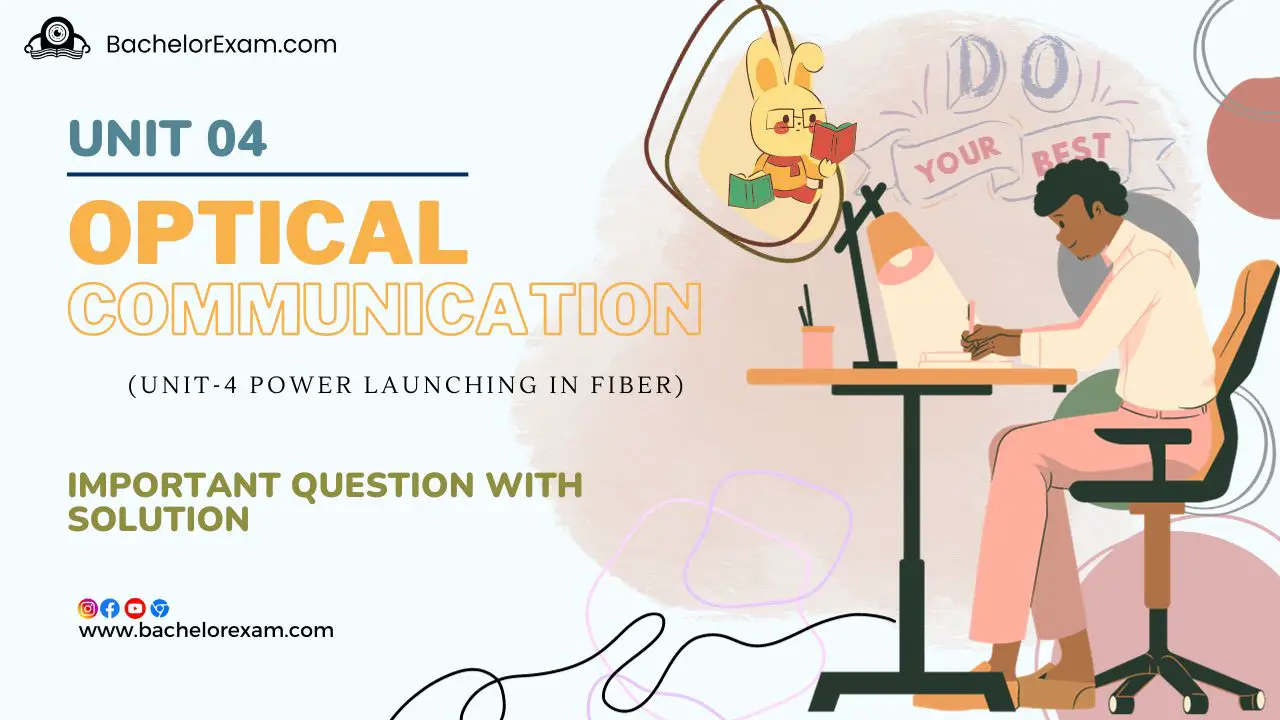Explore the world of optical communication with the B.Tech AKTU Quantum Book. Access key notes, repeated questions, and vital insights for understanding this cutting-edge technology. Unit-4 Power Launching in Fiber
Dudes 🤔.. You want more useful details regarding this subject. Please keep in mind this as well. Important Questions For Optical Communication: *Quantum *B.tech-Syllabus *Circulars *B.tech AKTU RESULT * Btech 3rd Year * Aktu Solved Question Paper
Q1. Write a short note on source to fiber power launching.
Ans.
- 1. Optical output from a source is measured in radiance.
- 2. The optical power radiated into a solid angle per unit emitting surface area is referred to as radiation.
- 3. Radiance is specified in watts/cm²/steradian.
Source output pattern:
- 1. Spatial radiation pattern of source helps to determine the power accepting capability of fiber.
- 2. Fig. shows three dimensional spherical co-ordinate systems for characterizing the emission pattern from an optical source. Where the polar axis is normal to the emitting surface and radiance is a function of 𝜃 and 𝜙.



- 3. The Lambartian output by surface emitting LED is equally bright from any direction.
- 4. The emission pattern of Lambartian output is shown in Fig. and its output is:



where, B0 is the radiance along the normal to the radiating surface.
- 5. Both radiation in parallel and normal to the emitting plane are approximated by expression



where, T and L are transverse and lateral power distribution coefficients.



Q2. Derive the expression for power coupling to a step index fiber by a surface emitting LED.
Ans. 1. For a step index fiber numerical aperture is not dependent on 𝜃s and r.
2. Thus LED power from step index fiber is



3. Consider optical power Ps emitted from source area As into hemisphere (2𝜋 Sr)



4. When source radius rs ≤ a, the fiber core radius, the LED output power is given from eq. (4.3.1)



Q3. Write short note on power launching versus wavelength.
Ans.
- 1. The optical power transmitted through a fibre depends simply on the source’s brightness, or radiance, and not on its wavelength.
- 2. The number of modes that can propagate in a multimode graded index fiber of core size a and index profile 𝛼 is



- 3. Thus, for example, twice as many modes propagate in a given fiber at 900 nm than that at 1300 nm.
- 4. The radiated power per mode, Ps/M from a source at a particular wavelength is given by the radiance multiplied by the square of the nominal source wavelength,



- 5. As a result, 1300 nm launches twice as much power into a given mode than 900 nm. As a result, the optical power launched into a fiber will be equal for two sources of the same size and brightness operating at different wave lengths.
Q4. Discuss the various factors which effect the launching of optical signal into fiber. Determine the power coupled into step index fiber whose n1 = 1.48, n2 = 1.46, if surface emitting LED radiates 150 𝛍W of power.
Ans. A.
1. Many variables, including the numerical aperture, core diameter, refractive index profile, radiance, and angular power distribution of the optical source, affect how an optical signal or optical power enters a fiber.
i. Optical power launched into fiber is only dependent on the brightness, or radiance, of the optical source and is not wavelength dependent.
The radiated power per mode, Ps /M from a source at a particular wavelength is given by radiance multiplied by the square of nominal source wavelength,



As a result, 1300 nm launches twice as much power into a given mode than 900 nm. Hence, the optical power launched into a single fiber by two sources of the same size and brightness but operating at separate wavelengths will be equal.
ii. When optical power is coupled from a source to a fiber, some optical power is lost. The light sources should be connected to a system fiber with a nominally equal NA and core diameter in order to obtain a low coupling loss. The fiber end face should be as close to and centred over the source’s emitting surface as is practical.
iii. For proper launching of optical power, there should be perfect coupling conditions between source and fiber. This can be achieved only if refractive index of medium separating the source and fiber end matches the refractive index n1 of the fiber core. But if the refractive index n of this medium is different from n1 then power coupled into fiber reduces by the factor



where R is Fresnel reflection.
B. Numerical:
Given: Pemitted = 150 m𝛺, n1 = 1.48, n2 = 1.46
To Find: Coupled power.



Q5. Write a short note on noise sources in optical fiber communication.
Ans. Noise sources in optical fiber communication are:
1. Quantum or shot noise: It arises from statistical nature of the production or collection of photoelectrons when optical signal is incident on a photodetector. The shot noise current has a mean square value in a receiver bandwidth BC which is proportional to average value of photocurrent Ip.



2. Dark current noise generated in bulk material of a photo diode: The bulk dark current iDB arises from electrons or holes which are thermally generated in the p-n junction photodiode. The mean square value of this current is given by



3. Surface dark current/surface leakage current: Surface flaws, cleanliness, bias voltage, and surface area all play a role. Through the use of a guard ring structure, which diverts surface leakage current away from the load resistor, dark current can be reduced effectively.
The mean square value of dark current is



Q6. Enumerate the principle of operation of APD.
Ans. 1. The second major type of optical communication detector is avalanche photodiode.



- 2. There is a high field region in the depletion region, where the majority of the photons are absorbed and the principal carrier pairs are produced, where holes and electrons can gain enough energy to excite new electron-hole pairs.
- 3. This process is known as impact ionization and is the phenomenon that leads to avalanche breakdown in ordinary reverse biased diodes.



- 4. To guarantee uniform carrier multiplication across the entire area, materials devoid of defects can be used to attain carrier multiplication factors as high as 104.
- 5. Full depletion in the absorption zone is necessary for these devices to operate at high speeds.
- 6. Carriers produced in undepleted material are gathered by the diffusion process very slowly.



Important Question with solutions | AKTU Quantums | Syllabus | Short Questions
Optical Communication Btech Quantum PDF, Syllabus, Important Questions
| Label | Link |
|---|---|
| Subject Syllabus | Syllabus |
| Short Questions | Short-question |
| Question paper – 2021-22 | 2021-22 |
Optical Communication Quantum PDF | AKTU Quantum PDF:
| Quantum Series | Links |
| Quantum -2022-23 | 2022-23 |
AKTU Important Links | Btech Syllabus
| Link Name | Links |
|---|---|
| Btech AKTU Circulars | Links |
| Btech AKTU Syllabus | Links |
| Btech AKTU Student Dashboard | Student Dashboard |
| AKTU RESULT (One VIew) | Student Result |
